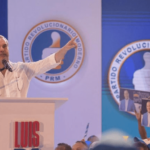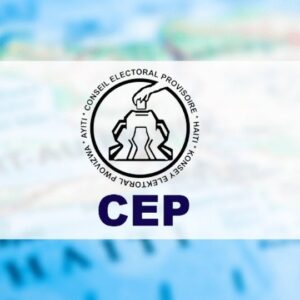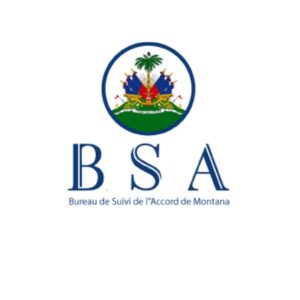P-au-P, 16 from 2024 [AlterPresse] — The Executive Council of the State University of Haiti (UEH) has established a working group [[1] on the problem of restitution of the independence debt [[2] imposed on Haiti and ransoms paid in the 19th and 20th centuries, according to a document seen by the online agency AlterPresse.
Conducting all studies and investigations to complete and strengthen the file, taking the necessary steps to finalize the calculations of the amounts to be claimed, informing and raising awareness of the Haitian State and the organized sectors of Haitian society on the different elements of the file are among the main objectives of this working group, lists the rectorate of the Ueh.
It is also appropriate to disseminate and publish, for the benefit of national and international public opinion, the various elements of the file and to create a real national mobilization, through the different national groupings of the various levels of local authorities.
This think tank should make it possible to identify all the national and international actresses and actors capable of moving this issue forward and taking the necessary measures, within the framework of a large coalition of national and international actresses and actors. international, to bring this matter to fruition.
Different research, survey, study and marketing strategies should be implemented by the think tank and work group, in order to achieve these objectives.
All survey and study activities (documentations, literature reviews, interviews, surveys, e-questionnaires, focus groups, etc.) will be undertaken by the reflection and work group to complete the data in the file.
Haiti impoverished by the debt of independence
“The double debt of independence has undoubtedly contributed to the impoverishment of the nation. The repayment of this double debt deprived the country, and for a long time, of a good part of its export revenues,” notes the Ueh rectorate.
This double debt also forced Haiti to establish, for the benefit of the former colonial power (France), extraordinary trade preferences.
The Haitian state was forced to pay large sums, drawn from the public treasury, with a view to settling various cases with international powers: cases[ÉmileLuders[ÉmileLuders[[3] ->https://fr.wikipedia.org/wiki/Affaire_Luders](Joaquín Gutiérrez de)[Rubalcava/JoaquínGutiérrezdeRubalcavayCasal(Ferrol1803-Madrid1881)[Rubalcava/JoaquínGutiérrezdeRubalcavayCasal(Ferrol1803-Madrid1881)[[4] ->http://www.manioc.org/gsdl/collect/patrimon/archives/PAP11077.dir/PAP11077.pdf]Case of Captain Karl Ferdinand[Batsch[Batsch [[5] ->https://www.alterpresse.org/spip.php?article2025]Mews Affairs, etc.), he recalls.
Ransoms imposed on the young nation as part of “gunboat diplomacy” include:
Extraordinary trade preferences for the benefit of France. imposed on Haiti as part of the Edict of Charles X on the recognition of independence. They lasted almost two centuries and ended in 1987. They too caused immense harm to the nation;
The ransoms paid on the occasion of these “Affairs”, which dot the history of Haiti in the 19th and early 20th centuries, notably the affair of Admiral Joaquín Gutiérrez de Rubalcava (Spain), the affair of Captain Karl Ferdinand Batsch (Germany), the Émile Luders affair (Germany), the Mevs affairs, forced loans (United States), the affair of Haitian-American Agricultural Development Corporation / Shada (UNITED STATES).
Reimbursement of the independence debt, a necessity
The High Commissioner for Human Rights of the United Nations (UN), the Austrian Volker Turk, considered it necessary for France to reimburse the double debt of Independence to Haiti, during an intervention at a forum of civil society organizations, held in Geneva on April 19, 2024.
A coalition of around twenty non-governmental organizations (NGOs) also asked France to reimburse the billions of dollars paid by Haiti for its independence.in a new call expressed during the permanent forum of the United Nations (UN) for people of African descent (Pfpad), held from Tuesday April 16 to Friday April 19, 2024 in Geneva (Switzerland), reported the site from the French newspaper “Libération”.
France owes more than 100 billion dollars (Editor’s note: US $ 1.00=+ 140.00 gourdes; 1 euro=143.00 gourdes; 1 Canadian dollar=97.00 gourdes; 1 Dominican peso=2.40 gourdes today) to the Caribbean island, which agreed to pay reparations after its independence in 1804, according to these organizations cited by “Libération”.
This coalition of NGOs is seeking to set up a new independent commission to supervise the restitution of the debt, which they describe as a ransom, reports the French newspaper.
“In an international conference organized on Saturday, May 4, 2024, by Catholic leaders from Latin America, the link was established, once again, by two former presidents of Costa Rica and Chile, between the chaotic situation experienced Haiti and the burden of repaying the famous independence debt to the former French metropolis,” relates the Ueh rectorate.
The rectorate of the Ueh underlines how the former president of Haiti, Jean-Bertrand Aristide, had brought to national and international consciousness the injustice and negative effects of the debt of independence, at the beginning of the 2000s.
Controversial assessment of the amount of French debt to Haiti
The Ueh rectorate cites the study, published in February 2023, by the newspaper “New York Times, which estimated the debt to Haiti at $21 billion.
This amount is much higher, according to supporters of paying off this debt.
To these 21 billion dollars, the Doctor in anthropologist, Professor Jemima Pierre, adds more than 200 years of interest, from which France has benefited.
The amount would therefore amount to 150 billion, 200 billion or more, insisted Dr. Jemina Pierre on the occasion of the United Nations (UN) permanent forum for people of African descent (Pfpad), held in April 2024 in Geneva (Switzerland).
Haiti became the first black republic in history to obtain its independence, on January 1, 1804, after a revolt of slaves, who defeated the army of Napoleon Bonaparte, the most powerful at the beginning of the 19th century.
Severe reparations were imposed on him by France, which claimed the loss of his income.
In an order dated April 17, 1825, Charles privileged commercial exchanges in favor of France.
This “debt” was not fully repaid until 1947. [emb rc apr 16/05/2024 11:50]
[[1] This reflection and working group includes, among others:
• Professor Judith Blanc, psychologist;
• Professor Eddy Labossière, economist;
• Professor Alvarez Louis, historian;
• Glodel Mezilas, specialist in international relations;
• Professor Alix René, historian;
• Professor Jean Marie Théodat, geographer
[[2] The independence of Haiti was acquired on January 1, 1804 against French colonists.
[[3] On September 21, 1897, the Haitian police were looking for a certain Dorléus Présumé, a resistance opponent, accused of theft: they found him, cleaning a car at the threshold of the Central Stables of Port-au-Prince managed by Emile Luders. Luders was attracted by the noise. For having assaulted an agent, he was sentenced to one month in prison by the police court (September 21, 1897). The criminal court, then ruling on appeal, found that there had been rebellion with assault, annulled the first sentence and sentenced the offenders to one year in prison (October 14, 1897).
Count Schwerin, charge d’affaires, demanded the immediate release of Émile Luders, the latter being of German origin, then the dismissal of the judges and the dismissal of the police officers involved in the affair (October 17, 1897). Probably with the aim of reaching an agreement, the government, after representations from Powell, Minister of the United States, pardoned Émile Luders, who left for abroad (October 22, 1897)
[[4] Rubalcava incident. — Because Haiti protected Santana’s adversaries, the Spanish admiral Rubalcava came to Port-au-Prince at the head of an imposing fleet and claimed to demand an indemnity of two hundred thousand piastres, and a salute of twenty-one gunshots. canon, no response (July 6, 1861). The Diplomatic Corps intervened. Fabre Nicolas Geffrard accepted part of the conditions: the compensation was reduced and the salute returned
[[5] The Captain Batsch affair on June 11, 1872: 15,000 dollars for two German traders who claimed to have suffered damage during the presidencies of Fabre Nicolas Geffard (1859-1867) and Sylvain Salnave (1867-1869)








